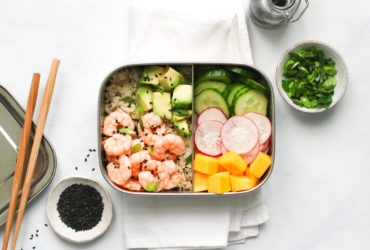
Top Nutrition Tips for Easing Heartburn
Heartburn is one of those frustrating yet common symptoms affecting approximately 21% of the UK adult population.[1]
It is characterised by a painful burning sensation in the upper abdomen or below the breast bone which can put a dampener on anyone’s day!
Fortunately, some simple dietary tweaks may help to control the onset…
1. Eat smaller meals more frequently, rather than two or three large meals
Eating until your full to bursting isn’t advisable for anyone, but particularly those suffering from heartburn.[2] Heartburn can be down to a lower oesophageal sphincter that doesn’t tighten as it should. Put simply, overeating can put internal pressure on the stomach, stomach acid can then get pushed into the oesophagus which can contribute to reflux.
Top tips for reducing portion size:
-
- Eat off a smaller plate
- The larger the pack the more we eat, choose smaller packets of food and you’re likely to consume less
- Eat more slowly, it takes at least 20 minutes for our brain to register that we may be full
2. Minimise alcohol
Whilst it’s absolutely fine to enjoy the odd glass of wine, if you’re serious about relieving your heartburn symptoms alcohol should be considered and limited.
Alcohol can increase stomach acid and relax the lower oesophageal sphincter, both of which are triggers for heartburn.[3]
-
- Spritzers – add sparkling water to your wine
- Vodka or gin with sparkling water and fruit infused water
- Seedlip – an alcohol-free spirit
- Beetroot and red apple juice
- Infused water – berries, cucumber, ginger
3. Fast eating and insufficient chewing
If you’ve been told to slow down when eating one too many times, it may be time to engage in mindful eating.
One interesting study following 180 heartburn sufferers, assessed their dietary habits by the use of dietary questionnaires. The results showed that fast eating and insufficient chewing were present in as much as 64.3-85% patients in comparison to only 15% of the examinees from the control group.[4]
Digestion starts in the mouth and by slowing down and chewing thoroughly, not only will your enjoyment of food improve but so will your digestion.
Top tips for mindful eating:
-
- Put your knife and fork down between each bite
- Chew each mouthful 10-15 times
- Avoid eating on the go
- Eat away from distractions such as TV, laptops or phone
4. Find your dietary trigger
Certain foods have been shown to trigger heartburn via various mechanisms. Common triggers include coffee, chocolate, citrus fruits and even spicy foods. However, it’s important to remember that we are all unique and triggers may vary from one person to the next.
Top tips to find your triggers:
-
- Keep a food and symptom diary
- Eliminate suspect food or drink for 2 weeks, then re-challenge the food whilst noting symptoms
- Switch coffee to barley cup or calming herbal teas
- Ditch the spices and flavour your foods with herbs such as oregano, thyme, chives, parsley, tarragon and parsley.
5. Think about fibre
Within the UK we are currently advised to consume 30g fibre per day, however, as a population, we are only obtaining 15-18g per day, half of our recommended allowance.
Accordingly, to epidemiological studies, the frequency of heartburn is negatively correlated with the amount of dietary fibre consumed. On top of this, a low intake of fibre has been shown to decrease stomach and gut motility as well as delay gastric emptying.[5] Both of these factors may contribute to the risk of heartburn.
Top tips to increase fibre:
-
- Choose fibre rich whole grains over white refined carbohydrates
- Keep the skin on your potato
- Aim for 5 a day
6. Minimise high-fat foods
Whilst many can find it hard to digest fatty or fried food before bed, those suffering heartburn really do struggle. High-fat foods can delay gastric emptying, which increases stomach pressure and in turn may promote heartburn.[6]
Top tips to limit fatty meals:
-
- Avoid deep fried foods
- Choose lean cuts of meat without the skin
- Use spray oil over bottled oil for cooking which helps to control portion size
- Bake or steam instead of fry
- Ditch high-fat dairy for their low-fat counterparts
References
1. https://www.ncbi.nlm.nih.gov/pubmed/15801917.
2. https://pdfs.semanticscholar.org/f6cd/a81d3d8472a5ad7a925e073651fc2bd9765c.pdf
3. https://www.ncbi.nlm.nih.gov/pubmed/15801917
5. https://www.ncbi.nlm.nih.gov/pmc/articles/PMC5989243/
6. https://www.cghjournal.org/article/S1542-3565(06)01303-6/pdf
*Article was written for Nexium Control https://www.nexiumcontrol.co.uk
About Lily
Lily is a London Nutritionist who graduated from Newcastle University with a BSc (Hons) degree in Food and Human Nutrition (AfN accredited) where she was awarded the Sage Faculty for Excellence Scholarship on an annual basis. She then went on to complete a 2-year post graduate Diploma in Nutritional Therapy and is currently working towards her MSc in Nutritional Medicine (AfN accredited) at the University of Surrey. Lily’s extensive knowledge of the science of food and health, enables her to regularly write for The Times, The Telegraph, The Daily Mail, The Independent, Women’s Health and Cosmopolitan.
Her frequent TV appearances include ITV’s This Morning with Holly Willoughby and Phillip Schofield, and ITV’s primetime series Save Money: Lose Weight with Dr Ranj Singh. Lily’s passion is to simplify the science around nutrition, to provide health hacks and smarter eating strategies to empower people to enjoy a healthy and successful lifestyle. Her specialities lie in workplace wellness, implementing nutrition focused wellbeing programmes within corporate organisations across the UK.
Lily also sees individual clients from her clinic in Chelsea and a private medical practice based in Notting Hill.




